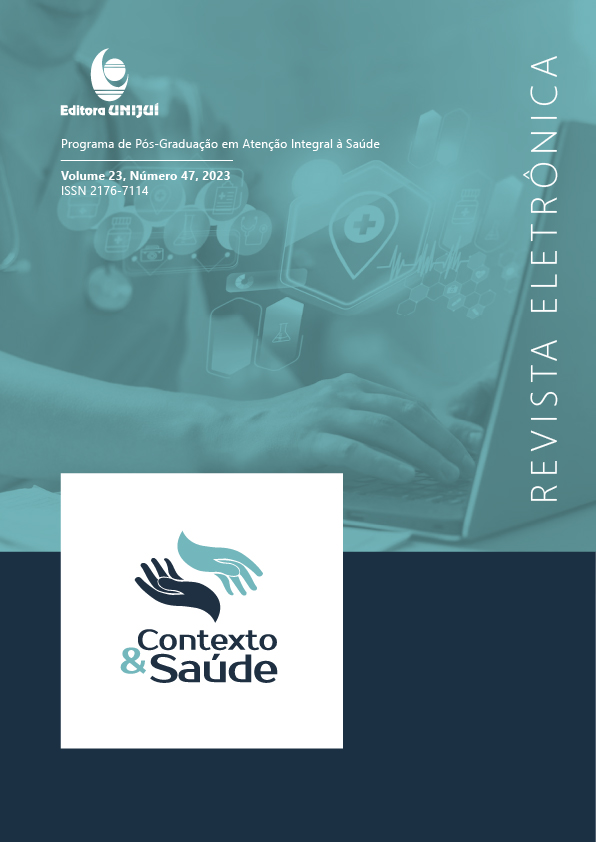Hesitation to vaccination for COVID-19 among the Brazilian adult population
DOI:
https://doi.org/10.21527/2176-7114.2023.47.12806Keywords:
COVID-19, SARS-CoV-2, VaccinesAbstract
Background: This study assessed the perceptions and attitudes of the Brazilian adult population about COVID-19 vaccines, seeking to identify which factors are associated with vaccine hesitancy and lack of trust in vaccines to support individual or group strategies for welcoming and guidance.
Methods: This is a national survey using a self-report web instrument in a representative sample of the Brazilian adult population (N=1700). The survey included sociodemographic and quality of life (QoL) questions, general information on COVID-19, and a vaccine-specific questionnaire.
Results: The vast majority of our sample expressed favorable opinions regarding COVID-19 vaccination, but there was also a minor fraction (2.2%) of respondents who are hesitant about COVID-19 vaccination. Most of them were males within the age range of 30 to 59 years and reported that their reasons for vaccine hesitation are mainly due to uncertainty about safety (57.9%) and efficacy (36.8%) of vaccines, followed by concern with their development, that is, the issue of timing and the adoption of a new development technology (28.9%). Further, while the impact of groups and peers on those who hesitate to vaccinate was not clear, their perception of a low risk of contracting the disease is evident.
Conclusions: There is a need to develop targeted strategies to increase effective communication about the risks and benefits of COVID-19 vaccines. Uncertainty about the safety and efficacy of vaccines, the timing, and the adoption of new development techniques affect significantly the perceptions on the vaccine COVID-19 acceptance.
References
Zhu N, Zhang D, Wang W, et al. A Novel Coronavirus from Patients with Pneumonia in China, 2019. N Engl J Med. Feb 20 2020;382(8):727-733. DOI: 10.1056/NEJMoa2001017
Hodgson SH, Mansatta K, Mallett G, Harris V, Emary KRW, Pollard AJ. What defines an efficacious COVID-19 vaccine? A review of the challenges assessing the clinical efficacy of vaccines against SARS-CoV-2. Lancet Infect Dis. Feb 2021;21(2):e26-e35. DOI: 10.1016/S1473-3099(20)30773-8
Wellcome Trust TGOL. Wellcome Global Monitor, 2018. 2019. SN 8466.
MacDonald NE, Hesitancy SWGoV. Vaccine hesitancy: Definition, scope and determinants. Vaccine. Aug 14 2015;33(34):4161-4. DOI: 10.1016/j.vaccine.2015.04.036
Bell S, Clarke R, Mounier-Jack S, Walker JL, Paterson P. Parents' and guardians' views on the acceptability of a future COVID-19 vaccine: A multi-methods study in England. Vaccine. Nov 17 2020;38(49):7.789-7.798. DOI: 10.1016/j.vaccine.2020.10.027
Seale H, Heywood AE, Leask J, et al. Examining Australian public perceptions and behaviors towards a future COVID-19 vaccine. BMC Infect Dis. Jan 28 2021;21(1):120. DOI: 10.1186/s12879-021-05833-1
Rzymski P, Zeyland J, Poniedzialek B, Malecka I, Wysocki J. The Perception and Attitudes toward COVID-19 Vaccines: A Cross-Sectional Study in Poland. Vaccines (Basel). Apr 14 2021;9(4). DOI: 10.3390/vaccines9040382
Syed Alwi SAR, Rafidah E, Zurraini A, Juslina O, Brohi IB, Lukas S. A survey on COVID-19 vaccine acceptance and concern among Malaysians. BMC Public Health. Jun 12 2021;21(1):1.129. DOI: 10.1186/s12889-021-11071-6
El-Elimat T, AbuAlSamen MM, Almomani BA, Al-Sawalha NA, Alali FQ. Acceptance and attitudes toward COVID-19 vaccines: A cross-sectional study from Jordan. PLoS One. 2021;16(4):e0250555. DOI: 10.1371/journal.pone.0250555
Wong MCS, Wong ELY, Huang J, et al. Acceptance of the COVID-19 vaccine based on the health belief model: A population-based survey in Hong Kong. Vaccine. Feb 12 2021;39(7):1.148-1.156. DOI: 10.1016/j.vaccine.2020.12.083
Paudel S, Palaian S, Shankar PR, Subedi N. Risk Perception and Hesitancy Toward COVID-19 Vaccination Among Healthcare Workers and Staff at a Medical College in Nepal. Risk Manag Healthc Policy. 2021;14:2.253-2.261. DOI: 10.2147/RMHP.S310289
Pineda D, Myers MG. Finding reliable information about vaccines. Pediatrics. May 2011;127 Suppl 1:S134-7. DOI: 10.1542/peds.2010-1722T
Gellin BG, Maibach EW, Marcuse EK. Do parents understand immunizations? A national telephone survey. Pediatrics. Nov 2000;106(5):1.097-1.102. DOI: 10.1542/peds.106.5.1097
Rosenstock IM, Derryberry M, Carriger BK. Why people fail to seek poliomyelitis vaccination. Public Health Rep. Feb 1959;74(2):98-103.
Downloads
Published
How to Cite
Issue
Section
License
Copyright (c) 2022 Revista Contexto & Saúde

This work is licensed under a Creative Commons Attribution 4.0 International License.
By publishing in Revista Contexto & Saúde, authors agree to the following terms:
The works are licensed under the Creative Commons Atribuição 4.0 Internacional (CC BY 4.0) license, which allows:
Share — to copy and redistribute the material in any medium or format;
Adapt — to remix, transform, and build upon the material for any purpose, including commercial.
These permissions are irrevocable, provided that the following terms are respected:
Attribution — authors must be properly credited, with a link to the license and indication of any changes made.
No additional restrictions — no legal or technological measures may be applied that restrict the use permitted by the license.
Notes:
The license does not apply to elements in the public domain or covered by legal exceptions.
The license does not grant all rights necessary for specific uses (e.g., image rights, privacy, or moral rights).
The journal is not responsible for opinions expressed in the articles, which are the sole responsibility of the authors. The Editor, with the support of the Editorial Board, reserves the right to suggest or request modifications when necessary.
Only original scientific articles presenting research results of interest that have not been published or simultaneously submitted to another journal with the same objective will be accepted.
Mentions of trademarks or specific products are intended solely for identification purposes, without any promotional association by the authors or the journal.
License Agreement (for articles published from September 2025): Authors retain copyright over their article and grant Revista Contexto & Saúde the right of first publication.

